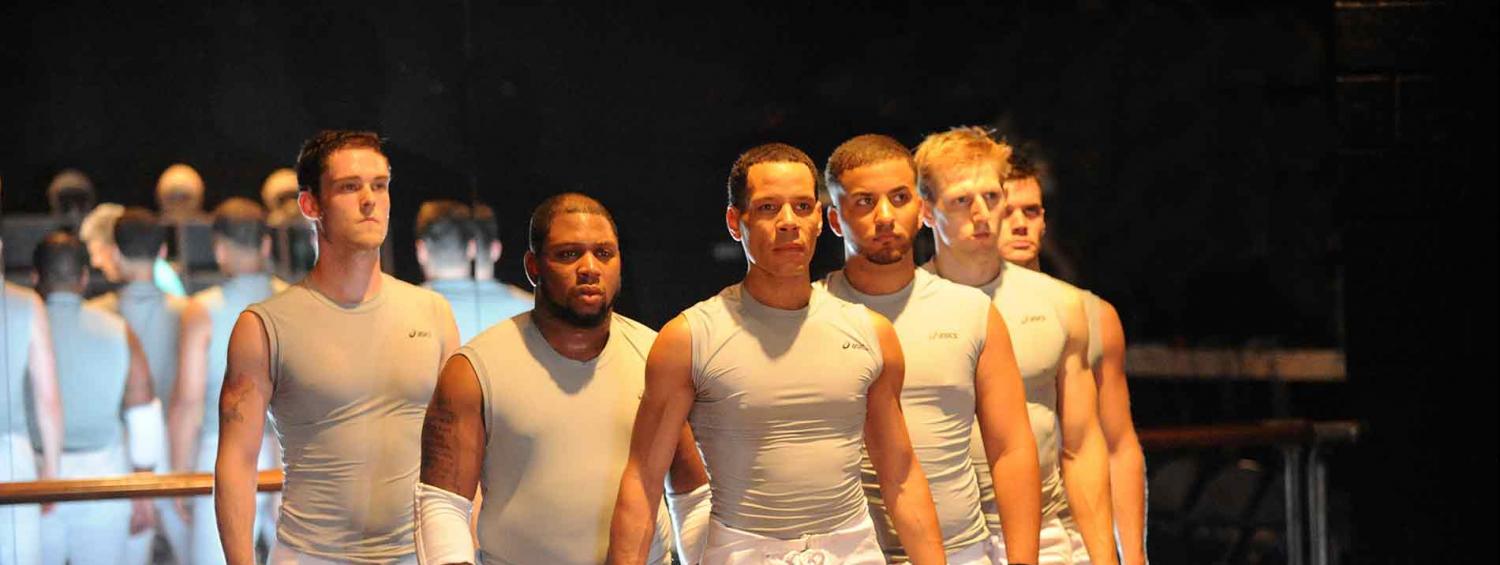Mingling in the OTC lobby after a recent production, I was approached by an older man, a long-time member of the theater. He gave me some compliments about the show he’d just seen, and then leaned in as if to share some bit of insider-trading info: “Jason, you know what you need to do to make a mint? Put on Mamma Mia! Your audiences would love it!” I told him that, sadly, the rights to professional production in our market were currently restricted, but I’d consider it at such time as they release them.
But will I, really?
Nonprofit arts organizations – from theaters to museums to opera companies and beyond – face two competing, and often diametrically-opposed, impulses in programming. Our privileged status as a tax-exempt entity requires us to provide cultural and educational experiences to the public that can’t compete in the marketplace. But we’re not wholly subsidized – that’s why you hear the refrain that ticket prices only cover half of our costs. So we need to balance our cultural and educational calling with plays and musicals that, while still adhering to our mission, appeal to the widest audience possible, selling as many tickets as possible.
Mamma mia, it’s tricky! And not for the reasons you might expect.
It’s not about snobbery. There might be – well, there are – artistic directors out there who wouldn’t be caught dead producing something populist. Shame on them, I say. That definitely isn’t me. So the answer is yes: I’d be happy to program a jukebox musical like Mamma Mia or a schmaltzy classic like Phantom of the Opera and rake in the bucks – if it was artistically worthy, if it was something meaningful for the community, and if we could do it with our own artistic vision. Just because a work is popular or a Broadway success doesn’t mean it lacks artistic or cultural value. I’d be a poor artistic director if I didn’t love those musicals as much as I love a daring four-person Hamlet or an edgy new play by an as-yet-undiscovered writer.
But I wouldn’t ever do a full season of them for a lot of reasons.
First, as our members have heard me say many times before, we don’t serve a single, monolithic audience. Our unique geography, our diverse community, and our broad mission demand we produce and present plays that appeal both to folks who rarely (if ever) go to live theater as well as culture-vultures. Embracing populist work done to our exacting standards alongside the challenging and avant-garde fare is in our DNA. Whether your taste runs to Golden Age musicals or the hottest new play, we’ve got you covered, and it’s fine by me if you only go to one or the other.
Another reason we don’t simply program hit after hit is that it wouldn’t serve the artists in our community, and giving them opportunities to stretch themselves and grow their talents is of vital importance to us. Think of your favorite actors, directors, designers in the DC community. At this time of year, I’m meeting with many of them so they can pitch me ideas for the coming season. And while one or two of them would like a shot at the Frankie Valli role in Jersey Boys, the vast majority are pitching the kinds of projects and roles the marketplace doesn’t support: classics by Eugene O’Neill or Friedrich Schiller or Sam Shepard; the complex and rarely-seen “trunk shows” by musical superstars; new plays on dark and difficult topics. These are the kind of juicy and compelling roles and plays that take artists in new directions. I want to honor their desire for artistic adventure, not only because I personally share it, but because I know it means our community – of artists and theatermakers and audiences – will all benefit from that rich experience that comes from artists colliding with complex texts.
And something I love about my job is this: just like artists, the audiences for less popular works are incredibly passionate about them. More than 20,000 patrons had a great time at Elf over the holidays, but the 2,000 folks who came to see Colossal, which won the Helen Hayes Award for Outstanding New Play five years ago, are still talking to me about it, and remembering it as something utterly impactful and enthralling. Both experiences are incredibly valuable and we’re proud to provide them. But (and this is a gross generalization; there are plenty of exceptions) those 2,000 people who saw Colossal are more loyal to OTC because they think of our contemporary shows – the new experiences we seek out and share – are an essential part of their cultural lives.
That passion and loyalty translates to dollars on the contributed side of the scale, which is just as important (and maybe moreso, because it’s not nearly as fickle). While there are a few funders that only value populist impact, the vast majority of them – from individuals to those heavy-hitters of the foundation community like the Mellons and Dukes and Carnegies – are far more interested in supporting work that advances the art form, takes risks, and has deep impact on its audience. Those folks know I don’t need their help to produce Mamma Mia; but they know for sure that ticket sales alone won’t pay for the production of a brand new play about, say, genocide.
Which brings me to the last part of this post: is it my imagination, or is the audience’s willingness to see serious plays diminishing by the year? I remember “coming of age” as a theatermaker in the 1980s and 1990s – decades we’ll probably look back on in a hundred years as golden times for plays that conquered the darkest issues at work in the world: Angels in America, Burn This, Aunt Dan and Lemon, Fences, M. Butterfly, One Flea Spare, How I Learned to Drive, Three Tall Women, Death and the Maiden, Blasted, Shopping and Fucking, In the Blood… it would certainly be a challenge to revive these plays now.
Even the big-name, darker classics don’t have the same cachet they once did. I remember my first trip to Germany in the 1990s, when I was told that your average German felt it was their duty to see a new production of Buchner’s unfinished 1837 masterwork Woyzeck every year. I was probably a little high on graduate school fumes at that point to unquestioningly believe it, but it’s also true that the 1993 production that I saw in Berlin was attended by throngs of young, ardent theatergoers. Today, the top-grossing shows in the history of the venerable Shakespeare Theatre in DC aren’t classic texts, but musicals: Man of La Mancha, Camelot, Kiss Me Kate.
To the point: I’d love to program a stunningly-acted production of O’Neill’s The Iceman Cometh, but would anyone come who hasn’t already sat through that four-and-a-half-hour psychological flagellation of the down-and-outs of the world bother to come? No one doubts that Chekhov’s The Cherry Orchard, which addressed the changing times for landed gentry in 1904, is a great play. But honestly, would you rather go see another production of the Chekhov, or are you more excited to see how Lord Grantham and Lady Mary deal with similar issues in the Downton Abbey movie coming out this fall? Picnic by William Inge is a pretty awesome look at gender roles in the 1950s. But if you ask me, The Marvelous Mrs. Maisel from Amazon Prime is doing that, too, and with a much more interesting contemporary resonance, and I can watch it on my iPad in the bathtub. (And I don’t have to worry about parking, either.)
That’s one of the reasons OTC is going to start investing in directorial takes on classics that really flip the script – you’re not going to see us producing too many “faithful” productions of Shaw and Ibsen. Instead, when we take on classics we’re going to seek out directors that shake up our notions of these timeless stories in unusual ways. Never just for the sake of novelty, of course, but for the sake of reimagining works for a contemporary sensibility. Will that involve strange casting choices? Virtual reality experiments? Immersive productions? I certainly hope so.
Which means we at OTC need to take a serious look at our performance spaces. The Mainstage is fantastic for intimate viewings of musicals, but its width makes it unfriendly for smaller plays, and audience expectations can make it inhospitable to newer works. That’s because folks show up at the Mainstage expecting a certain level of polish, and new musicals can be messy, experimental affairs. But we don’t want to segregate new works in the 150-seat Lab, with its small playing space. We’d simply be reinforcing the presumptions that new works should a) be small in scale and b) can’t possibly appeal to a large audience. So where do we go to experiment with new forms of storytelling? If I can tease just a little, expect a big announcement this fall about how we’re going to make OTC’s venues more friendly to every kind of performance.
In the meantime, yes, it’s probably more likely I’ll program Mamma Mia than Iceman Cometh in the near future. But it’s also true that we’ll be doing work you wouldn’t see anywhere else in the region, and serving the community in new and unexpected ways. As I like to say, I want to make sure everyone in the community has a reason to come to OTC at least a few times a year. As long as I’m your artistic director, that’s going to be true.
Box Office: 301.924.3400
Open Wednesday - Sunday: 12:00 PM - 6:00 PM






